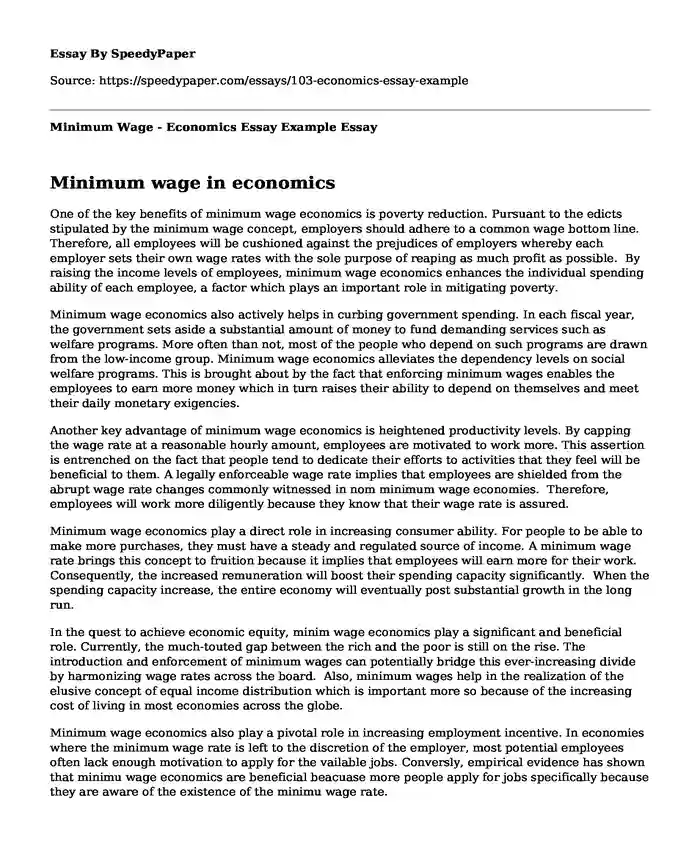
| Type of paper: | Essay |
| Categories: | Government Society Minimum wage |
| Pages: | 2 |
| Wordcount: | 513 words |
Minimum wage in economics
One of the key benefits of minimum wage economics is poverty reduction. Pursuant to the edicts stipulated by the minimum wage concept, employers should adhere to a common wage bottom line. Therefore, all employees will be cushioned against the prejudices of employers whereby each employer sets their own wage rates with the sole purpose of reaping as much profit as possible. By raising the income levels of employees, minimum wage economics enhances the individual spending ability of each employee, a factor which plays an important role in mitigating poverty.
Minimum wage economics also actively helps in curbing government spending. In each fiscal year, the government sets aside a substantial amount of money to fund demanding services such as welfare programs. More often than not, most of the people who depend on such programs are drawn from the low-income group. Minimum wage economics alleviates the dependency levels on social welfare programs. This is brought about by the fact that enforcing minimum wages enables the employees to earn more money which in turn raises their ability to depend on themselves and meet their daily monetary exigencies.
Another key advantage of minimum wage economics is heightened productivity levels. By capping the wage rate at a reasonable hourly amount, employees are motivated to work more. This assertion is entrenched on the fact that people tend to dedicate their efforts to activities that they feel will be beneficial to them. A legally enforceable wage rate implies that employees are shielded from the abrupt wage rate changes commonly witnessed in nom minimum wage economies. Therefore, employees will work more diligently because they know that their wage rate is assured.
Minimum wage economics play a direct role in increasing consumer ability. For people to be able to make more purchases, they must have a steady and regulated source of income. A minimum wage rate brings this concept to fruition because it implies that employees will earn more for their work. Consequently, the increased remuneration will boost their spending capacity significantly. When the spending capacity increase, the entire economy will eventually post substantial growth in the long run.
In the quest to achieve economic equity, minim wage economics play a significant and beneficial role. Currently, the much-touted gap between the rich and the poor is still on the rise. The introduction and enforcement of minimum wages can potentially bridge this ever-increasing divide by harmonizing wage rates across the board. Also, minimum wages help in the realization of the elusive concept of equal income distribution which is important more so because of the increasing cost of living in most economies across the globe.
Minimum wage economics also play a pivotal role in increasing employment incentive. In economies where the minimum wage rate is left to the discretion of the employer, most potential employees often lack enough motivation to apply for the vailable jobs. Conversly, empirical evidence has shown that minimu wage economics are beneficial beacuase more people apply for jobs specifically because they are aware of the existence of the minimu wage rate.
Cite this page
Minimum Wage - Economics Essay Example. (2018, Feb 22). Retrieved from https://speedypaper.com/essays/103-economics-essay-example
Request Removal
If you are the original author of this essay and no longer wish to have it published on the SpeedyPaper website, please click below to request its removal:
- Thesis Paper Example: Cash Management in FMCG Sector
- Martin Luther King - Essay Sample
- Essay Sample on the Impact on the Children of Syrian Refugee Crisis
- Debt-Financed Tax Cuts - Essay Sample on George W. Bush Policy
- Essay Sample on the Leadership Lesson from the Pulse Nightclub Shooting in Orlando, Florida
- Free Essay on Problems in Strategic Planning
- Paper Example. Social Construction and Medicalisation
Popular categories




